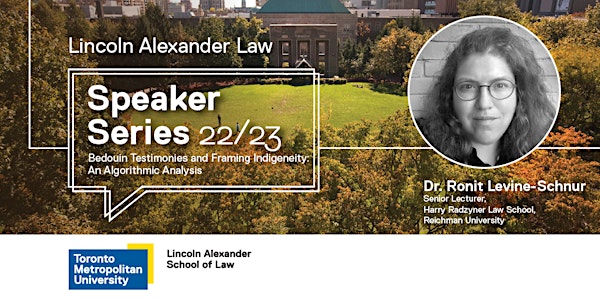
Bedouin Testimonies and Framing Indigeneity: An Algorithmic Analysis
This event is part of the Lincoln Alexander Law Speaker Series 2022/23
Date and time
Location
Lincoln Alexander School of Law
350 Victoria Street Podium Building, 4th Floor - POD455 Toronto, ON M5B 2K3 CanadaAbout this event
Bedouin Testimonies and Framing Indigeneity: An Algorithmic Analysis
In this talk, Dr. Ronit Levine-Schnur considers whether Bedouin communities presenting their claims within the framework of consultation mechanisms act in accordance with the purpose of the process as defined by the state, or do they insist on bringing forth their collective historical narrative. To test this question, an algorithmic and statistical model that allowed to “listen from afar” to a large corpus of testimonies delivered before inquiry commissions was developed.
The use of advanced computational analysis techniques of topic modelling allowed the identification of the themes and topics that are raised by the Bedouin Indigenous minority before two Israeli state commissions that operated in parallel in 2008, in relation to the ongoing land dispute between the Bedouin society and the State of Israel. Estimating a multiple logistic regression model, we find that Bedouin speakers use the limited speaking time they have before the commissions to voice a theme concerning their communal land possession, reflecting the historical narrative of Bedouin communities.
The study, which will be the topic of this session, reveals that Bedouin speakers act in a sophisticated manner that negotiates their collective history storytelling with future-oriented demands. When not prevented from doing so, the minority group shapes the consultation procedures to include a discussion of the past, while also negotiating necessary adjustments to meet the process’ purpose as set out by the government. The research, thus, sheds light on how consultations are being designed by Indigenous communities from below, with the consequent normative implications for the development of consultation procedures in future cases.
ABOUT THE SPEAKER
Dr. Ronit Levine-Schnur is a senior lecturer at the Harry Radzyner Law School, and a research associate at the G-City Institute for Real Estate, at Reichman University (IDC Herzliya), Israel. She is a lawyer, an urban planner, and a property and land use law expert. Dr. Levine-Schnur is mostly interested in studying and measuring the effects of regulatory and other legal mechanisms on the socio-spatial distribution of social and economic burdens and benefits and on the effects of social and economic factors on decision-making processes. Her current research project focuses on building national narratives and peace-making with respect to territorial disputes. Dr. Levine-Schnur's research appeared in journals such as Journal of Legal Studies, Law and Social Inquiry, and the Oxford Journal of Legal Studies.
Dr. Levine-Schnur obtained her LL.D. (Ph.D. equivalent) from the Hebrew University of Jerusalem Faculty of Law in 2015. She also holds a Master’s degree in Law and Urban and Regional Planning from this institution. Dr. Levine-Schnur was previously a Halbert Post-doctoral fellow at the University of Toronto, Canada, and a Visiting Fellow at the London School of Economics and Political Science.